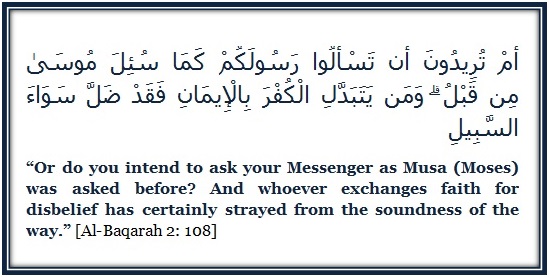Tafseer Surah Baqarah Verse 108 | Surah Baqarah explanation in English | Surah Baqarah explained | Surah Baqarah Ayat 108
Tafseer Surah Baqarah Verse 108 | Surah Baqarah explanation in English | Surah Baqarah explained | Surah Baqarah Ayat 108 Translation
بِسْمِ اللَّهِ الرَّحْمَـنِ الرَّحِيمِ
In the Name of Allah, the Most Gracious, the Most Merciful
The Prohibition of Unnecessary Questions
 |
| Surah Baqarah Verse 108 |
The word tasalu [تَسْأَلُوا] is from the root seen-hamza-laam which gives the meaning: to ask, interrogate, inquire or question. The word suila [سُئِلَ] is also from the same root.
The word sawaa [سَوَاءَ] is from the root seen-wau-ya and it gives the meaning of: make uniform, even, congruous or consistent. The word sabeeli [سَّبِيلِ] is from the root seen-ba-laam and it means cause, way, path or road.
It was the habit of the Jews to never obey the prophets in the first instance. Each time that they were asked to do something they made insolent demands first. For example, when Prophet Musa [Moses] ‘alayhi salaam returned from his meeting with Allah subhanahu wa ta’ala and brought the Torah with him, the Jews refused to believe unless they saw Allah subhanahu wa ta’ala with their own eyes. As a result of such an outrageous demand, they were struck by a thunderbolt and all of them died. Later, Prophet Musa ‘alayhi salaam pleaded to Allah subhanahu wa ta’ala and they were brought back to life.
In Surah Al-Ma’idah ayah 101, Allah subhanahu wa ta’ala says,
يأَيُّهَا الَّذِينَ ءَامَنُواْ لاَ تَسْأَلُواْ عَنْ أَشْيَآءَ إِن تُبْدَ لَكُمْ تَسُؤْكُمْ وَإِن تَسْأَلُواْ عَنْهَا حِينَ يُنَزَّلُ الْقُرْءَانُ تُبْدَ لَكُمْ
“O you who believe! Ask not about things which, if made plain to you, may cause you trouble.
But if you ask about them while the Qur’an is being revealed, they will be made plain to you.” (5:101).
This ayah means that if you ask about a matter after it is revealed, it shall be duly explained to you. Therefore, do not ask about matters that have not occurred yet, for they might become prohibited, due to your questions.
In a hadeeth it has been narrated,
إِنَّ أَعْظَمَ الْمُسْلِمِينَ جُرْمًا مَنْ سَأَلَ عَنْ شَيْءٍ لَمْ يُحَرَّمْ، فَحُرِّمَ مِنْ أَجْلِ مَسْأَلَتِه
“The greatest criminal among the Muslims is the one who asks if a thing is prohibited, which is not prohibited, and it becomes prohibited because of his asking about it.”
When the Messenger of Allah salAllahu ‘alayhi wa sallam was asked about a husband who finds another man with his wife; if he exposes the adultery, he will be exposing a major incident; if he is quiet about it, he will be quiet about a major matter. The Messenger of Allah salAllahu ‘alayhi wa sallam did not like such questions. Later on, Allah subhanahu wa ta’ala revealed Surah Nur ayaat 6-9. The Two Sahihs recorded that Al-Mughirah bin Shu`bah said that the Messenger of Allah salAllahu ‘alayhi wa sallam forbade saying, “It was said” and “He said,” [qeel o qaal] wasting money and asking many questions.
Muslim recorded that the Prophet salAllahu ‘alayhi wa sallam said,
ذَرُونِي مَا تَرَكْتُكُمْ، فَإِنَّمَا هَلَكَ مَنْ كَانَ قَبْلَكُمْ بِكَثْرَةِ سُؤَالِهِمْ وَاخْتِلَافِهِمْ عَلى أَنْبِيَائِهِمْ، فَإِذَا أَمَرْتُكُمْ بِأَمْرٍ فَأْتُوا مِنْهُ مَا اسْتَطَعْتُمْ وَإِنْ نَهَيْتُكُمْ عَنْ شَيْءٍ فَاجْتَنِبُوه
“Leave me as I leave you; those before you were only destroyed because of their excessive questioning and disputing with their prophets. Therefore, when I command you with a matter, adhere to it as much as you can, and when I forbid from something, avoid it.”
The Prophet salAllahu ‘alayhi wa sallam only said this after he told the Companions radhiAllahu ‘anhum that Allah has ordered them to perform Hajj. A man asked, “Every year, O Messenger of Allah?” The Prophet salAllahu ‘alayhi wa sallam did not answer him, but he repeated his question three times. Then the Prophet said,
لَا، وَلَوْ قُلْتُ: نَعَمْ، لَوَجَبَتْ وَلَوْ وَجَبَتْ لَمَا اسْتَطَعْتُم
“No! Had I said yes, it would have been ordained, and you would not have been able to implement it.”
This is why Anas bin Malik radhiAllahu ‘anhu said, “We were forbidden from asking the Messenger of Allah about things. So we were delighted when a bedouin man would come and ask him while we listened.”
Muhammad bin Ishaq narrates that this particular ayah (ayah 108) was revealed after a certain incident. Some Jews (Rafi’ bin Huraymilah or Wahb bin Zayd) said, “O Muhammad! Bring us a Book sent down from heaven and which we could read, and make some rivers flow for us, then we will follow you and believe in you.” It was due to their hostility towards the Messenger salAllahu ‘alayhi wa sallam that they made such demands. Allah subhanahu wa ta’ala sent down the answer to this challenge,
أَمْ تُرِيدُونَ أَن تَسْـَلُواْ رَسُولَكُمْ كَمَا سُئِلَ مُوسَى مِن قَبْلُ وَمَن يَتَبَدَّلِ الْكُفْرَ بِالإِيمَـنِ فَقَدْ ضَلَّ سَوَآءَ السَّبِيلِ
“Or do you intend to ask your Messenger as Musa (Moses) was asked before? And whoever exchanges faith for disbelief has certainly strayed from the soundness of the way.”
The purpose of their asking was not to seek guidance, to satisfy their doubts or to strengthen their faith. Rather, they only asked to cast aspersions on a prophet, or to question the wisdom of Allah subhanahu wa ta’ala. The ayah indicts this behavior as kufr (disbelief) because such demands are improper.
“And whoever exchanges faith for disbelief has certainly strayed from the soundness of the way,” meaning, whoever prefers disbelief to faith he has strayed from the straight path, to the path of ignorance and misguidance. This is the case of those who deviated from accepting the prophets and obeying them and those who kept asking their prophets unnecessary questions in defiance and disbelief.
We seek refuge with Allah subhanahu wa ta’ala from asking unnecessary questions and laghw, and everything that might take us closer to disbelief. Ameen.















No comments:
Post a Comment